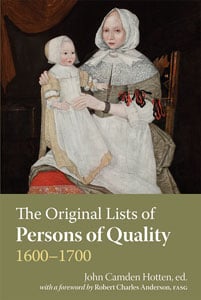 John Camden Hotten first published The Original Lists of Persons of Quality – his compilation of documents relating to seventeenth-century migration to New England, the Chesapeake, and the Caribbean – more than a century and a quarter ago, and it remains one of our most valuable and accurate sources for that period. He included in the volume the surviving records from the London Port Books, along with lists from some of the English outports. In addition, he included some muster rolls from Virginia, and other items listing early settlers there.
John Camden Hotten first published The Original Lists of Persons of Quality – his compilation of documents relating to seventeenth-century migration to New England, the Chesapeake, and the Caribbean – more than a century and a quarter ago, and it remains one of our most valuable and accurate sources for that period. He included in the volume the surviving records from the London Port Books, along with lists from some of the English outports. In addition, he included some muster rolls from Virginia, and other items listing early settlers there.
Agents of the crown at London and at the lesser English ports maintained registers of those passengers boarding ships for ports outside England. These were not like the passenger manifests of the nineteenth century. In the 1630s they were, rather, attempts by the English authorities to ascertain that those departing were loyal to the crown, and were not departing without paying any of the national taxes that had been assessed on them. (In these years Charles I was ruling without Parliament, and had to employ extraordinary means to collect revenue.)
For example, the London port book for 1635 provides extensive information on those passengers boarding vessels bound for the New World. The port book was originally compiled in chronological order, and that order has been maintained by Hotten. All those boarding a given ship on a given day are grouped together with ages and, in some cases, occupations also provided. Passengers are sometimes listed in family groups, and sometimes not. Passengers for each ship arrived over a period of many days or even weeks, so a complete passenger list for each ship must be compiled by gathering together the shorter lists entered day-by-day.
These records published by Hotten have been one of the most important sources utilized in the compilation of the published volumes of the Great Migration Study Project. In the course of more than two decades of research on that project, there have been frequent opportunities to check Hotten’s reading of these records against the original, with the result that the version published by Hotten has always been deemed to be accurate.
Despite the passage of more than a century, and despite the publication of several more versions of some of these records in the intervening years, this volume by Hotten remains the best source for seventeenth-century passenger records, and should be preferred to all others.
Adapted from the foreword to the new NEHGS edition of John Camden Hotten's Original Lists of Persons of Quality.
Share this:

About Robert Charles Anderson
Robert Charles Anderson, Director of the Great Migration Study Project, was educated as a biochemist and served in the United States Army in electronics intelligence. In 1972 he discovered his early New England ancestry and thereafter devoted his time and energies to genealogical research. He published his first genealogical article in 1976, and about the same time began to plan for what eventually became the Great Migration Study Project. In 1983 he received a Master’s degree in colonial American History from the University of Massachusetts at Amherst. Anderson was elected a Fellow of the American Society of Genealogists in 1978 and has served as Secretary and President of that organization. He became a Contributing Editor of The American Genealogist in 1979, Associate Editor in 1985 and Coeditor in 1993. He has been an editorial consultant to the New England Historical and Genealogical Register since 1989.View all posts by Robert Charles Anderson →